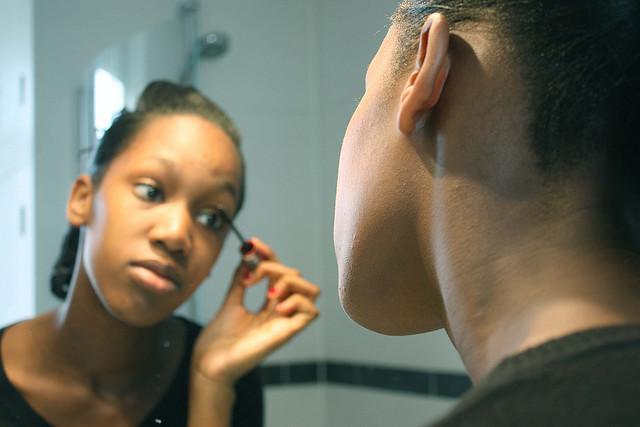I want to put my face on
By Britt Julious

I want to put my face on
By Britt Julious
I grew up inside of the beauty stores that littered Madison Avenue in Oak Park. I have definitive memories of beauty and childhood: the first time my mother used a hot comb on my hair, my strange and strong desire to cut off my long thick locks (and the moment in which I actually did it), the first burn of a first relaxer. But none stick out so clearly in my mind as the beauty supply store, probably because, unlike those earlier experiences, going to the store was a ritual itself. This was not a one-time moment of trauma or fear; this was a homecoming every few weeks.
According to Essence’s 2009 Smart Beauty research study, black women spend $7.5 billion annually on beauty products, while paying 80 percent more on cosmetics and twice as much on skin care products than the general market. Reading this was affirmation of something I’ve always known: we want. We want to play and protect and hide and and comfort ourselves in the same way that a “new face” can for others.
In high school, a dance teammate asked, “Can black people even wear eyeshadow? Does it even show up on your skin?” And so, although I want and we as black women want, what remains is a blissful, perhaps even deliberate ignorance to those desires. They can’t possibly want, they think. And if they do, does it ever even matter?
Earlier this year, my mother, sister, aunt, family friend, and I attended a beauty “trunk show” event hosted by Nordstrom. My mother had grown to love these shows. Everything was exciting, from the waiting in line to the runway presentations, to the free samples at the end.
“Honey, sit down. I’ll take care of you,” a representative from Smashbox told me as we lingered near their display. I was interested in trying their CC (color correcting) cream, the latest advancement on their BB cream. As a woman with years of acne, hyper pigmentation, and the most sensitive of skin, BB creams emerged as my chance to create a face that was clear and smooth and average. Average escaped me most of my life.
“I’m going to get this,” I later told her after she applied her products.
“Me too!” my mother said.
“And me as well!” my aunt chimed in.
“Will this work for me?” my mother whispered to me before handing over her purchase. She wondered not because it was something new or she was not a professional. She wondered because we are shades considerably different. My mother has light skin with freckles. My father’s skin is much darker. My sister and I ended squarely in the middle.
Smashbox had one shade for darker-skinned women. This is their fault and yet not. In many ways, they are just competing at the same plateau as their fellow beauty brands. I was reminded of reading teen magazines as a child.
SKIN CARE FOR PALE SKIN, FOR LIGHT SKIN, FOR OLIVE-TONED SKIN, FOR DARK SKIN.
We were left with few options in my childhood. There was one foundation color for black skin in youth theater and it did not match my skin. When at first our faculty sponsors did the make-up, they covered me from limb to limb, leaving no surface bare. “We can’t have you all mismatched,” a woman said.
I told my mother, “I don’t like this, but I don’t really know why,” and she just nodded her head. As an adult, little had changed.
On a family trip to Maui two years ago, I went inside of a local Walgreens and stood in the hair care aisle in awe. Lined on the shelves were the products and brands I came to understand as my own, the kind that were made for my hair.
“They have more black hair care products than any Walgreens I’ve seen in Chicago,” I told my mom.
The comment was made as a moment of humor at first, but quickly grew into a moment of questioning and then a moment of anger. My thoughts began as thoughts of amusement and ended as thoughts of recognition. At home, I thought, your needs are not good enough. At home, I continued, your needs are no one’s but your own.
“That’s not surprising,” my mother responded to me in the car as we prepared to leave the store. Eventually, we are conditioned to not care as much and then to not care at all. This is what it is. I heard it in my mother’s voice. This is not surprising.
There will always be beauty supply stores for as long as there will be black American women. But I do not live mere blocks away from these stores anymore. I live in neighborhoods where a quarter of one shelf dedicated to creams and gels and conditioners for my kinky coils is generous. This is not a plea. This is what it is. It does not make me uncomfortable anymore. Whether that is a good thing is yet to be seen.
As a child I used to find beauty supply stores strange and overwhelming. The truth, I recognize now, is that a lifetime without access to the things I wanted or needed trapped me in a cycle of loathing for something I could not comprehend. These merchants want you to want them.
Britt Julious writes about culture in and outside of Chicago. Follow Britt’s essays for WBEZ’s Tumblr or on Twitter @britticisms.
